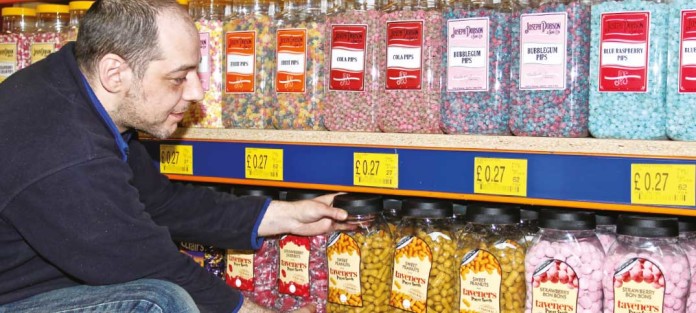Hancocks CEO Mark Watson tells tan parsons about his plans to expand the company’s reach.
Hancocks Cash and Carry’s newly opened Rochester depot is off to a flying start. With more than 70 new customers through the door on day one, there has been a clear appetite in this part of the world for the confectionery specialist’s offering.
It has surpassed Hancocks’ other recent openings in Dundee, Leeds, Reading and Croydon – and it completes the jigsaw around London, plugging a gap in the wholesaler’s reach to the east of the capital.
“It’s been tremendous and we’ve had a good range of customers coming – it’s been really positive,” says Hancocks CEO Mark Watson.
As a rule of thumb, a Hancocks depot with 500 regular trading customers can ‘pay its way’, and once that total reaches around the 600-800 mark, you are getting into the zone of what Watson calls a “good depot” – which is the target for Rochester.
The new warehouse is deliberately sited a stone’s throw from the Booker depot in town, so that retailers doing their weekly grocery shopping need only make a small detour to stock up on specialist confectionery. It is specialisation that has consistently made Hancocks stand out.
The jewel in Hancocks’ crown is the Kingsway brand. “Kingsway – wherever it is, that’s come from us somewhere,” says Watson. As well as distributing directly to independent retailers, Hancocks also sells to other wholesalers that then take the products and drive them up to Cambridge, Norwich and Ipswich, where Hancocks does not have a base. These companies do a valuable job distributing the group’s products, says Watson.
While Hancocks stocks all the biggest confectionery brands – “What sort of specialist would you be if you didn’t have these?” asks Watson – it is the own-label lines, such as the various pick and mix products, where retailers can really make their money.
“We are massive on pick-and-mix,” he says. “It’s a real point of difference for the customers and it has high margin for them as well. To us, if people are just selling the brands, they will be out of business.”
Instead of earning 20% out of a leading branded countline chocolate bar, retailers can earn 100% or more on pick and mix, he says – for instance, buying a 100g bag for 22p and selling it for 50p or even £1. He believes there is a genuine problem with the price point and lack of margin on some of the biggest confectionery brands – not many independent shops sell top branded countlines at 55p – it’s 70p and 80p because the margin’s not there.
“That’s why they’re premium priced. It doesn’t help their sales or our sales because the customer won’t buy it, because it’s 70 or 80p, but the retailer can’t afford to sell it at any less.”
The internet is an increasingly important part of Hancocks’ business model, with 35,000 customers now registered online. Sales in the most recent full year reached £2m and are growing at 70% so far this year.
Watson says: “The world is changing – when I started 38 years ago, you didn’t have online and everybody came to the cash & carry. But now our strategy is that wherever there’s confectionery being sold, whatever channel that’s through, we want to be in that channel.
So whether it’s delivered, cash & carry, collect or online, we’ve got to offer that service because that’s what our customers want.”
A big part of Hancocks’ online sales is new business from customers too far away to visit a depot. The group aims to make deliveries within 48 hours of orders being placed and to ensure it remains a cost-effective operation, deliveries for online orders of £150 or more are now free.
Customers are trading up to get to £150 and average spend is rising, with one customer in Scotland recently placing an online order of £2,200 – there would be “no hope” of getting that business any other way, says Watson.
A new customer’s average spend is between £150-£160, but the return spend is above £200 on average. As Watson points out, it makes far more sense to send out a delivery of £200-£300’s worth of stock than a van carrying a £20 order.
Having a solid web strategy isn’t just about growing business in the traditional retail channel, however. Having great search engine optimisation can direct other types of businesses your way – Google ‘wholesale confectionery’ or ‘wholesale sweets’ and Hancocks will always be in the top four search results.
“We’re getting a lot of these corporate companies – let’s say your office might have 100 employees, you’re coming up to Easter or Christmas, and you want to give them a little gift. So we get people buying 1,000 Easter eggs or 1,000 bunnies or whatever it might be.
“They don’t know anything about confectionery or where to get it from so they look online. Everybody searches online these days, don’t they?”
For the future, in addition to growing trade at the Rochester branch, Watson is considering further acquisitions and the potential to expand business into Europe.
“Cash & carry-wise, it’s a question of what do we do over the water – do we go over to Ireland, do we go over to the continent? That would be the next growth from there. Or do we do it through the internet?”
Hancocks has an export division and currently goes to about 40 different countries. The biggest buyers are expat bases, such as Australia, Canada and Spain, but there are also customers in the Bahamas and Barbados.
Whether you look at it in terms of geographical or digital horizons – or as a combination of the two, Hancocks is clearly expanding its reach.
Watson says: “It’s tough – it’s not easy, and you’ve got to be reinventing yourself all the time.”








